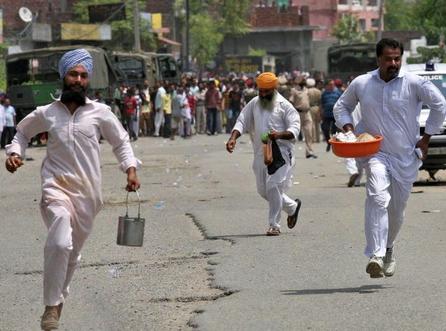New Delhi, Jul 27: The gunbattle between terrorists and the Punjab Police in Gurdaspur district, which stretched for over 10 hours, came to an end at around 5:30 p.m.
Police officials confirmed that four policemen, including an SP rank officer, and three civilians were killed in the attack.

“Ruk ruk key fire aaraha hai [the gun shots are coming irregularly],” Salwinder Singh, the Superintendent of Police in Gurdaspur, who is heading the police operation on the front line, told media. “We have no clue how many [terrorists] are inside. It seems three or four are still active. I think the operation will continue all night.”
A group of terrorists, who as per the Punjab Police, had crossed the International Border near Gurdaspur district early morning. They planted the bombs on a railway track and subsequently launched their assault that left three civilians and four policemen dead. The Punjab Police swung into action and neutralised two terrorists by noon.
The Indian Army from Pathankot district arrived at the spot, but the Punjab Police was unwilling to involve them in the operation. “We are very well trained and well equipped to deal with this matter on our own,” said Rakesh Kaushal, Senior Superintendent of Police in Gurdaspur. “The Army has been kept on a standby mode.”
Earlier, former Chief Minister of Jammu & Kashmir Omar Abdullah said that the attack had a striking resemblance with the ones carried out in March in Samba and Kathua sectors of Jammu region.
In response to Mr. Abdullah’s analysis, K. Rajendera, the Director General of Police in Jammu & Kashmir, told The Hindu that it’s too early to draw such parallels. “We are watching the situation very closely,” he said.
Chief Minister Parkash Singh Badal condemned the terror attack and said terrorism was not a State problem and has to be tackled through national policies.
“Terrorism is a national problem, it is not a state problem. It has to be tackled by national policies,” Mr. Badal said.





Comments
Add new comment